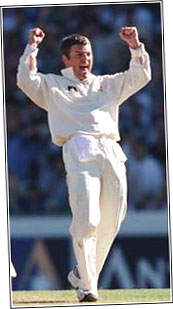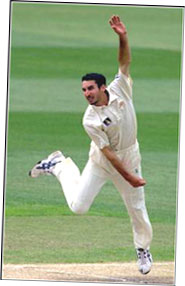
Bombay readies seaming wicket for Aussies
Faisal Shariff
"Last year," he reminds me, "I had promised that the game would have a result. It was a good sporting wicket, and I promised that it would last all of five days. What can I do if the batsmen couldn’t cope with it?"
For those with short memories, the last time India played a Test here was in February of 2000 -- and South Africa, the opponents in question, swept to a four-wicket win to begin the end of India's unbeaten record at home.
Memon suggests that incompetence, and not the wicket, was the real problem. "Remember how Laxman had a problem facing those rising deliveries from Shaun Pollock?," he asks. "Wasim Jaffer also had a problem with the pace in the wicket. He was bowled in the first innings, and was caught at second slip in the second innings."
That brings up the age-old question -- why not, given our problems against pace, prepare a spinning track which, in fact, national skipper Saurav Ganguly has been clamouring for?
Memon doesn't agree with Ganguly on this one. "The risk," he points out, "is that we might end up playing into the Australians' hands. We don't have world class spinners -- whereas Australia have three, in Shane Warne,  Stuart McGill and Colin Miller. Warne and McGill will love a turning track and as for Miller, he could get a game as well, because not only is he a good bowler, but he is also a good exponent of varying his pace well. A spinning track, therefore, just might be what the Aussies themselves are hoping for."
Stuart McGill and Colin Miller. Warne and McGill will love a turning track and as for Miller, he could get a game as well, because not only is he a good bowler, but he is also a good exponent of varying his pace well. A spinning track, therefore, just might be what the Aussies themselves are hoping for."
Memon, who has been curator of the Wankhede for quite a while now, is not only an expert on pitch preparation, but also a shrewd cricketing brain capable of thinking up strategy. "The best thing," he muses as he thinks of the coming encounter, "would be to prepare a patta wicket, the kind that is chockful of runs. The Aussie batsmen," he explains, "are tough. Prepare a challenging track, and they focus even more. But if you prepare one of those tracks where the ball is not coming on, where the batsmen won't get out easily but where they have to work patiently for their runs, that might be the way to defeat the Australians. You have to get them to bat for long periods under the sun, you can't give them tracks where the ball comes nicely onto the bat and permits quick scoring. The weather has to be used as your weapon -- you will notice if you think of past tours, that when they have to work in the hot sun to get runs, they tend to give away their wickets after scoring 30, 40. The heat, the noise, gets to them after a while and they just give it away."
Memon is not sure if this is the strategy the Indian team is thinking about. He is, however, confident that the wicket will be ideal for the first Test of what should be a very crucial series for both sides. "If you compare my Wankhede wicket to the Bangalore wicket in the last series against South Africa," he reminds you, "you will see that the game at Wankhede was much closer. India could -- in fact, should, have won the game here, but the bowlers just didn't get their line right. Main kya kar sakta hu? (What can I do?) If we can get out for 113 runs in home conditions, then the tourists should never have been allowed to get 164 to win that match. If you remember that match, Chopra didn't get to bowl at all in the second innings."
Memon believes that bowlers who lack ability tend, later, to blame the pitch for not "assisting" them. "For example," he points out, "take the match where Rest of India played Mumbai in the Irani Trophy. The Mumbai spinners failed to get any turn on their home wicket. At lunch and at tea, they kept telling me that there was nothing in the wicket. And then, when Mumbai batted, Murali Karthik came on to bowl, that boy put his heart and his shoulder into every ball, he was making the ball dacne and he ended up with nine wickets, remember?"
However, Memon suggests that given the paucity of good spinners (Memon doesn't say so, but it could also be that the Indian captain doesn't have too much faith in the young spinners now available), the trick could be a seaming track. "If the wicket is fast and bouncy, the likes of McGrath, Gillespie and Lee will rip through the batting," he argues. "But if it is a seaming wicket, our bowlers are better equipped to counter, as they rely on seam and not pace. In fact, the pitches committee has agreed that the best idea is to prepare a seaming track," says the man who is tasked with preparing the ground for the upcoming encounter.
"But if it is a seaming wicket, our bowlers are better equipped to counter, as they rely on seam and not pace. In fact, the pitches committee has agreed that the best idea is to prepare a seaming track," says the man who is tasked with preparing the ground for the upcoming encounter.
How does he rate India's chances on that kind of track? "Actually, it depends on the batting. If the batsmen have the patience to wait at the wicket for long hours, then India should win."
Rather curiously, when chatting with a senior Indian player over the weekend, I heard almost identical views. "The only way out is to bat the Aussies out of the game," this player told me. "Patience and accumulation will be the key for us."
In passing, there's this story:
A senior official of the South African side went up to a player recently, and asked him to autograph something. 'There is this boy who wants your autograph, he is suffering a terminal illness,' the official told the player.
The player gladly obliged. And next day, much to the bemusement of the official, the player sought him out and asked, "By the way, this boy you were telling me about, which airport did he fall sick in?"
We won't name the player concerned, not wanting to embarass him. However, we can vouch for the fact that this is a true story.
The Rediff Diary will, in tone and shape, take the place of the Rediff Email Diary. The latter will be reworked, and will resume in a different avtaar shortly. Meanwhile, starting today, the Rediff Diary will, five days a week, provide you with an inside view of what is happening in Indian cricket -- Editor
Related Links:
The Rediff Email Diary -- the complete archives